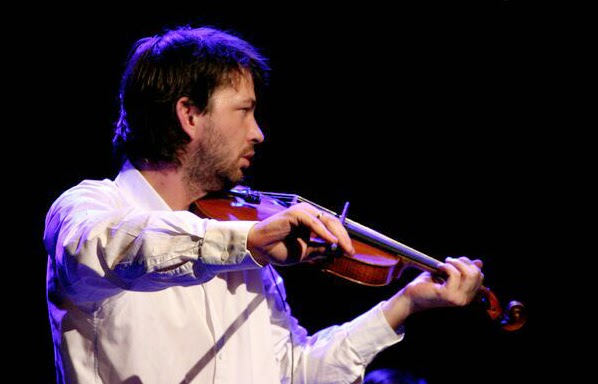BEGNAGRAD
The group Begnagrad was formed in Ljubljana in 1975 by
Bratko Bibic: accordion,vocals
Bogo Peckinar: clarinet
Igor Nusevic: drums
Vlado Spindler: Bass
They recorded some material in 1977 at a Novi Sad radio station released by Novi Sad Label Nikad Robom during the 90's as a cassette called "Jodlovskaurska" and later on a CD called "Tastare".
From 1979 to 1981 they stopped their activies and after that they re-started from the original nucleus Bibic-Peckinar adding Nino De Gleria: bass , Ales Rendla drums and violin and Boris Romih percussions, guitar.
This group released their first Lp "Begnagrad" in 1982 (re-realeased later by AYAA on CD as "Konzert For a Broken Dance")In 1983 they composed and recorded the music for the long feature film "Eva" and 3 short films by Slovenian film director F. Slak.
"Begnagrad's music was based on the collective and individual work of its musicians and it tried to go beyond the usual representation of traditional music structures in order to explore their untouched potentialities. It was surely inspired by folk (mostly Yugo), jazz, rock, and "serious music". Begnagrad tried to modify these musics , using its instruments to create a new, undefinable kind of music ,whose intention was to decline the specific problematic into a new sensibility.
Every Begnagrad concert is a new experience for its musicians in order to communicate this new sensibility , even in the form of a broken dance. It's sometimes a desperate try to invoke a new Dionysian feast."
We met them in Reims where they were playing at the festival "Musiques Traverses" in 1983
How did you start to play this kind of music?
We started around seven years ago, at the time we were also playing folk themes. But we think that music keeps changing all the time. I suppose that our music is very much shaped by the instruments we are using.: Normally, the music we like, is not played with these instruments. Accordion and clarinet are very popular instruments in our land Slovenia, and they are the basis of our folk music, which was originally influenced by German folk music.
Did you only make one record during these 7 years?
Yes, because in reality, we stopped our activity for around two years and after that only two members of the original group were left.
And what about the distribution of your record?
Well, the record company that produced it knew that it wasn't a commercial product, so they didn't spend much money for its distribution. We sent some copies to Recommended Records but we had to buy them from our record company because they don't care about exportation.
Is it a commercial record company?
Yes, the produce many kinds of music and they are based in Lubyana.
Did you have "political" problems playing this kind of unconventional music in Yugoslavia?
No,not at all.
Do you often play live in your country?
We have some logistical problems because two of us are studying in Graz (Austria) and they spend most of their time there.
And about your European concerts?
Before this tour we only played once in Trieste (Italy). It was a concert organised by some friends of us. It was a leftist school. We had to wait the end of the Yoga lesson before starting our concert. It was amazing!
Who did influence your music?
As a group we don't recognize any kind of influences, as individuals we have many.
And Yugo folk?
Only one piece of ours ha a traditional intro, but we composed all the rest.
Do you have other activities outside the music field?
Yes, as I told you, two of us are students in Austria, one is working and the other 2 are studying at the jazz academy and playing as semi-professionals.
Are there other interesting groups in Yugoslavia?
Yes but they are different from us.
Do you have contacts with them?
Sometimes we play together.
What about your future projects?
We don't know what we will do tomorrow!
Would you like to do a record outside Yugoslavia?
It would be very nice!
Many of the members of Begnagrad took part in the group Bratko Bibic and The Medleys but this is another story........
SOME VIDEOS:



























































